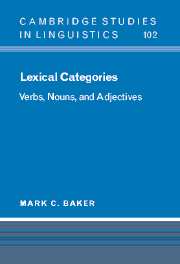Book contents
- Frontmatter
- Contents
- Acknowledgements
- List of abbreviations
- 1 The problem of the lexical categories
- 2 Verbs as licensers of subjects
- 3 Nouns as bearers of a referential index
- 4 Adjectives as neither nouns nor verbs
- 5 Lexical categories and the nature of the grammar
- Appendix Adpositions as functional categories
- References
- Index
5 - Lexical categories and the nature of the grammar
Published online by Cambridge University Press: 06 January 2010
- Frontmatter
- Contents
- Acknowledgements
- List of abbreviations
- 1 The problem of the lexical categories
- 2 Verbs as licensers of subjects
- 3 Nouns as bearers of a referential index
- 4 Adjectives as neither nouns nor verbs
- 5 Lexical categories and the nature of the grammar
- Appendix Adpositions as functional categories
- References
- Index
Summary
In the core chapters of this book, I have defended particular claims about what it is to be a noun, a verb, or an adjective. I have also argued that all natural languages have essentially the same three-way distinction among lexical categories. Grammatical systems that do not have one of these categories are perfectly imaginable. Such systems could achieve approximately the same expressive power as a three-category language by using periphrastic constructions built around the functional category that corresponds most closely to the absent lexical category. But such languages seem not to exist. In this final chapter, I step back from the details of particular languages and particular lexical categories to reflect briefly on what these results might show about the basic design of the human language capacity.
Some large-scale questions that are still to be faced are these. What exactly bears a category? Is it fundamentally roots that are categorized as nouns, verbs, and adjectives, or is it stems, or inflected words, or the minimal leaves of a syntactic tree, or the maximal X°s, or even larger phrases? For which of these linguistic units is category inherent, and for which is it derivative or even undefined? A logically similar and partially related set of questions concerns whether the category distinctions are fundamentally syntactic, semantic, or morphological in nature. One intriguing (and maddening) aspect of this topic is that whether something is a noun, verb, or adjective seems to have relevance in all three of these domains. Yet presumably the category distinctions inhere fundamentally in one domain and then project into the others; otherwise it would be a kind of coincidence that parallel categorial distinctions exist in each domain.
- Type
- Chapter
- Information
- Lexical CategoriesVerbs, Nouns and Adjectives, pp. 264 - 302Publisher: Cambridge University PressPrint publication year: 2003



